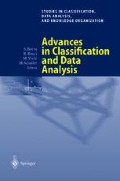Abstract
The use of Multivariate Regression Models with mixed data to evaluate and decompose relative effectiveness of different social agencies presents numerous problems. The solution proposed is to use the Seemingly Unrelated Equations Models (SURE) in the framework of Multilevel Analysis, following quantification of the response variables by means of simultaneous Multidimensional Scaling methods. An example is provided.
For a systematic explanation of these concepts see Gori and Vittadini (1999), pp. 135–146
Access this chapter
Tax calculation will be finalised at checkout
Purchases are for personal use only
Preview
Unable to display preview. Download preview PDF.
References
Aitkin M., Longford N. (1986) Statistical modelling issues in school effectiveness studies, Journal of the Royal Statistical Society, 149, 1, 1–43.
Carey V., Zeger S. L., Diggle P. (1993) Modelling multivariate binary data with alternating logistic regressions, Biometrika, 80, 3, 517–526.
Copas J. B., Li H.G. (1997) Inference for non-random samples, Journal of Royal Statistical Society, B, 59, 1, 55–95.
Cox D. R., McCullagh P. (1982) Some Aspects of Analysis of Covariance, Biometrics, 38, 541–561.
Fitzmaurice G. M., Laird N. M. (1997) Regression models for mixed discrete and continuous responses with potentially missing values, Biometrics, 53, 110–122.
Fleiss J. L. (1986) The design and analysis of clinical experiments, Ed. Wiley.
Gelman A., Rubin D. B. (1992) Inference from Iterative Simulation using Multiple Sequences, Statistical Science, 7, 4, 457–472.
Geyer J. C. (1992) Practical Markov Chain Monte Carlo, Statistical Science, 7, 4, 473–483.
Gori E. (1992) La valutazione dell’efficienza ed efficacia dell’istruzione, Comunicazione invitata alla XXXVI Riunione Scientifica della S.I.S., Pescara, 21–24 Aprile 1992, 219–229.
Gori E., Vittadini G. (1999) La valutazione dell’efficienza ed efficacia dei servizi alla persona. Impostazione e metodi, in Qualità e valutazione nei servizi di pubblica utilità, Etas, 121–241.
Haagen K. L., Vittadini G. (1998) Restricted Regression Component Decomposition, Metron, 56, 1–2, 53–75.
Heagerty P. J., Zeger S. L. (1996) Marginal regression models for clustered ordinal measurements, Journal of the american statistical association, 91, 435, 1024–1036.
Hox J.J. (1994) Hierarchical regression models for interviewer and respondent effects, Sociological methods and research, 22, 3, 300–318.
Hox J.J. (1995) Applied Multilevel Analysis, TT-Publikaties, Amsterdam.
Judge G. G., Griffiths W. E., Hill R. C., Lee T. S., Lütkepohl H. (1980) The Theory and Practice of Econometrics, Wiley, New York.
Liang K. Y., Zeger S. L., Qaqish B. (1992) Multivariate regression analyses for categorical data, Journal of Royal Statistical Society, B, 54,1, 3–40.
Rasch G. (1960), Probabilistic Models for Some Intelligence and Attainment Tests, Danmarks Paedagogiske Istitut, Copenaghen.
Rice N., Leyland A. (1996), Multilevel models: applications to health data, Journal of health services research and policy, 1, 3, 154–164.
Rilstone P., Veall M. (1996), Using bootstrapped confidence intervals for improved inferences with seemingly unrelated regression equations, Econometric Theory, 12, Dec 1996, 569–580.
Srivastava V. K., Giles D. E. A. (1987) Seemingly Unrelated Regression Equations Models, Marcel Dekker, New York
Vittadini G. (1997) Una metodologia statistica per la performance evaluation dei servizi alla persona di pubblica utilità, Atti del convegno «La statistica per le imprese» organizzato dal SIS, Torino, 2–4 IV-1997,I, 387–401
Vittadini G. (1999) “Analysis of qualitative variables in structural models with unique solutions”, in Classification and Data Analysis - Theory and Application, a cura di M. Vichi e O. Opitz, Springer (1999), 203–210.
Young F. W., de Leeuw J., Takane Y (1976) Regression with qualitative and quantitative variables: an alternating least squares method with optimal scaling features, Psychometrika, 41, 4, 505–529.
Author information
Authors and Affiliations
Editor information
Editors and Affiliations
Rights and permissions
Copyright information
© 2001 Springer-Verlag Berlin Heidelberg
About this paper
Cite this paper
Vittadini, G. (2001). On the Use of Multivariate Regression Models in the Context of Multilevel Analysis. In: Borra, S., Rocci, R., Vichi, M., Schader, M. (eds) Advances in Classification and Data Analysis. Studies in Classification, Data Analysis, and Knowledge Organization. Springer, Berlin, Heidelberg. https://doi.org/10.1007/978-3-642-59471-7_28
Download citation
DOI: https://doi.org/10.1007/978-3-642-59471-7_28
Publisher Name: Springer, Berlin, Heidelberg
Print ISBN: 978-3-540-41488-9
Online ISBN: 978-3-642-59471-7
eBook Packages: Springer Book Archive

